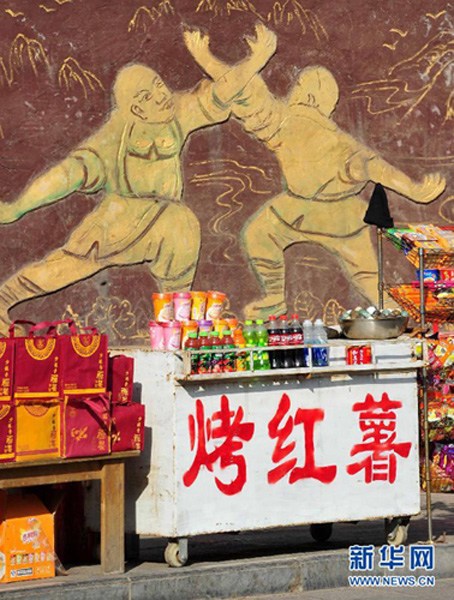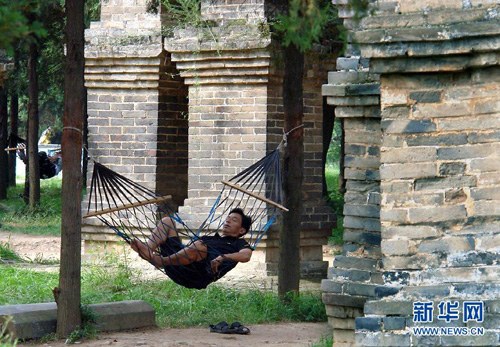
Peddlers cry their wares in front of painted wall of Shaolin Temple.

A staff member of Shaolin Temple is sleeping in a hammock hanging between two trees.
(Ecns.cn)--The Shaolin Temple scenic spot may lose its top-class rating due to poor management following an undercover inquiry by the National Tourism Administration, according to the Oriental Outlook, a weekly Chinese-language magazine run by Xinhua News Agency.
Shaolin Temple, which is recognized as the origin of Chan Buddhism and the cradle of Chinese kung fu, failed to meet the criteria of a national 5A class tourist attraction—China's top rating for scenic spots in terms of service, quality and environment.
The investigation revealed piles of garbage, disorderly service and traffic paralyzed by roadside venders and dealers, with unlicensed taxis parked here and there, salespersons chasing tourists with souvenirs, and many people dressed like monks engaged in fortune-telling or the promotion of products.
Inside, the temple was too crowded due to a lack of tourist flow management; places selling food were disorganized; the tourist area was too small and chaotic; and the medical center was short of supplies, said the report.
The National Quality Ranking Committee of Tourist Attractions issued a notice on December 4, 2011, requiring the scenic spot to launch and complete an overhaul of its operations before the end of March 2012. If it is unable to meet the criteria by then, it will lose its 5A rating, according to a China Daily report on Monday.
The local tourism administration has also been ordered to address the problems urgently and properly.
Zheng Shumin, director of the publicity department at Shaolin Temple, confirmed to China Daily that the temple is cooperating with the local government to rectify the problems.
Zheng added that the temple is the victim of poor management by China Travel Service (CTS), a Hong Kong-based company that took over the temple in December 2009.
"For the temple and the monks here, what we care about is the protection of the religious culture, not the commercial profits," Zheng noted. "It is the CTS that should be held responsible for the poor management of the temple."
The company is very reluctant to invest in promoting management at the temple, and "they only care about making money," revealed insiders at CTS.
"CTS refused to approve the budget for irrigation. As a result, more than 300 trees have died of drought," Wang Hu, a staff member told the Oriental Outlook.
Shi Yongxin, the abbot of Shaolin Temple, admitted to the magazine that there were some problems, including a lack of cleanliness and tourists being coerced into buying products in places around the temple.
Shi added he is not satisfied with the current surrounding environment at the temple and suggested that management should be improved. "The Shaolin Temple should be a clean and quiet spot," he said.
However, CTS has denied the accusations. Han Xiaohu, deputy marketing manager, responded that the scenic spot has reached an historic peak in terms of revenue and visitor number due to the efforts of the company in the last two years.
Financial statistics from CTS show that the number of visitors grew by 30 percent in 2010, and that revenue increased by 50 percent to 170 million yuan. Last year also saw increases of 20 percent in both visitors and revenue.
Qian Guoping, manager of CTS's branch in Dengfeng, Henan Province, argued that the company invested 5 million yuan in 2010 in infrastructure for the temple. In 2011, their total input rose to 18 million yuan in a bid to modernize equipment and maintain facilities.
"The funds have been allocated to specific projects, some of which are already underway, while some haven't been launched yet," noted Qian.
Speaking of the current challenges facing the temple as a five-star scenic spot, Qian explained that some are problems left over by history--yet some have been caused by CTS's poor management.
"But in most cases, employees don't listen to us and refuse to do as we say, even if we approve their applications for funds," he sighed.
"Interests are the core reason for such a dilemma," pointed out an insider familiar with both CTS and Shaolin Temple. The CTS has drastically reduced its costs in order to maximize profits, which has resulted in a sharp drop in its employees' incomes. As contradictions between the two sides have grown, the company has gradually lost control over staff members.
"It is the CTS, not the workers, that should be to blame for the crisis. It was just a matter of time before the company ran into trouble, since it has been bent solely on profits," argued a former CTS employee.

Copyright ©1999-2011 Chinanews.com. All rights reserved.
Reproduction in whole or in part without permission is prohibited.